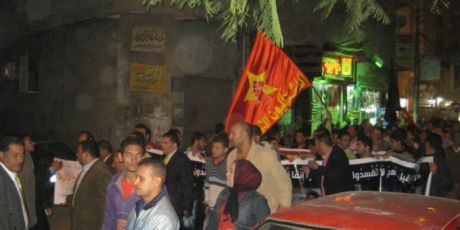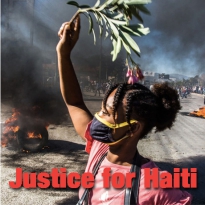Features
You are here
Inside Egypt's constitution

December 14, 2012
Egyptians haven’t ousted Mubarak to replace him with another dictator. The name of the ruling party changed, but the demands of pro-democracy Egyptians remain the same—an end to the state’s oppression and repression.
President Mohamed Morsi has been in power for only a few months. Those few months were a test for him: whether he will keep up with the aspirations of people as the first elected non-military president, or attempt to roll back the revolution. Morsi failed the test.
On Sunday, Morsi gave the military the authority to arrest civilians until the result of the Constitutional Referendum is declared. Under Morsi’s order, the military supports the police claiming to protect “vital institutions.” In another statement, Morsi said that civilians arrested would not be tried in a military court. While a crackdown is launched on opposition protesters and activists, Salafists and pro-Muslim Brotherhood militia men are not being investigated despite their several violations including brutally beating and harassing pro-democracy demonstrators. Morsi’s attacks and partial retreats have sparked mass protests against the constitution.
With or against the constitution: a false dichotomy of secular vs Islamist
Those who support the constitution are trying to use religious justifications to deceive people. While many who are for the constitution are Salafists, Muslim Brotherhood members or their allies and supporters, others are naively supporting it being told that it is religiously prohibited to go against it and if anyone goes against it, then he or she would be considered as disruptive to the Muslim unity.
On Tuesday, December 11, eight of of Al-Azhar Sheikhs joined the opposition demonstrators who were marching to the presidential palace. The Sheikhs (religious figures) were holding a banner saying, “Yes to Sharia, no to the constitution,” and marched towards the beginning of the protest. Their participation was a good sign to prove to Morsi’s government and his supporters that the dividing line in society is not between secular and Islamist, and that a united front is forming against oppression, fundamentalism and neoliberalism.
Tensions between the pro-democracy protestors and those supporting the constitution are increasing in the lead up to the referendum scheduled on December 15 and 22. According to a report published on Egyptian Independent, the Egyptian Federation of Human Rights filed a charge with the prosecutor general, requesting the arrest of the members of the so called Ansar Al-Sharia Brigades for posting on Facebook a list of assassination targets in case the state fails. The list of targets includes pro-democracy activists and prominent Coptic figures.
Inside the constitution
Following the demonstrations and people’s mobilization against the constitution and the Constitutional Referendum, it is essential to know the key concerns—outlined by human rights organizations including Human Rights Watch:
1. Protection of rights
Parts of the constitution are vaguely worded, which gives the state the right to interfere in the private lives of individuals. According to article 10 in the Chapter on State and Society: “The state and society shall commit to preserving the true nature of the Egyptian family.” In the same chapter, article 11: “The state shall protect ethics and morals and public order.”
If the constitution is passed, it is most likely that the state will persecute those who don’t conform to “the nature of the Egyptian family.” The state, Muslim Brotherhood and Salafists will determine this nature of the family and will be able to control the lives and decisions of people. Judging people on the basis of morals and ethics, which differ from individual to other, also violates rights of ordinary people in Egypt.
2. Freedom of expression:
Freedom of expression is protected, according to article 45, but “the individual person may not be insulted.” This article could be implemented to prosecute critics of the government and activists. According to Human Rights Watch, criminal prosecutions on charges of “insulting the president” or “insulting the judiciary” have increased since Morsi took office.
4. Freedom of religion:
Article 43 on freedom of religion limits the right to practice religion and to establish places of worship to Muslims, Christians and Jews. Establishment of places of worship is limited to the Abrahamic religions only. This discriminates against and excludes minorities including Bahais, Shias and Ahmadis and other sects who are in sometimes considered non-Muslims by Salafist groups and other extremists. In addition to that, followers of non-Abrahamic religions would not be permitted to establish any places of worship. The article is vaguely written which makes it possible for the state to also prosecute followers of the Abrahamic religions if they don’t seem to fit the mainstream religious schools of thought.
5. Women’s rights:
Article 10 says: “The state shall provide free motherhood and childhood services and shall balance between a woman’s obligations towards the family and public work.” By implementing this, women will be controlled by the state. The patriarchal state will have the right to discriminate against women and interfere with women’s choices in their families or at work. In the recent draft, there is no prohibition on trafficking of women. This puts women in areas suffering from poverty at the risk of exploitation.
6. Military trials of civilians:
The secular military did not interfere with the fundamentalist articles drafted by Salafists and members of Muslim Brotherhood. However, the military had a huge influence on the draft by not eliminating military trials on civilians. Article 198 of the final draft says: “Civilians may not be tried before the military justice system except for crimes that harm the armed forces, and this shall be defined by law.” This makes it possible for the state to try the arrested protesters and activists at a military court claiming that they caused harm to the armed forces.
A decision to be made— unity needed
The state is also launching an attack on unions and workers, in addition to the above concerns that affect the working class in general—like women’s rights, freedom of expression, freedom of religion and other issues.
But Egyptians ousted Mubarak who was in power for decades and they are continuing to fight for their rights—creating the possibility of permanent revolution. But this won’t happen if people organize along lines of secular vs Islamist–leading some secular forces to form alliances with the remnants of the old regime and other supporters of neoliberalism. Egypt’s Revolutionary Socialists are calling for “the formation of a revolutionary front, free of the remnants of the old regime, to continue the struggle to complete the aims of the revolution to win bread, freedom and social justice.”
Being in solidarity with Egyptians against Western-backed neoliberalism and imperialism will help them establish real democracy.
Section:
- Log in to post comments










